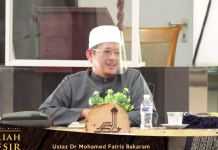This article is a summary of takeaways from Ustaz Dr Mohamed Fatris Bakaram’s Tafsir Online Lecture on 26th July 2020. Summaries of previous lectures on Surah Maryam and Surah Taha and Surah Al-Ambiya’ can be found here. This lecture is a continuation of the previous lecture on Surah Al-Hajj.
Abstaining from Cutting Hair and Nails for Qurban
Q: As the head of the household, I have made Qurban (sacrifice) of a single sheep on behalf of the whole family. Is it encouraged for the whole family to refrain from cutting their hair and nails, or is it applicable only for the head of the household?
As we know, it is a Sunnah that is highly encouraged for people who pledge to make Qurban to not cut their hair and nails from the 1st of Zulhijjah to the time where their animal has been sacrificed. My opinion – and there may be other differing opinions out there – is that because this Qurban is done for the whole family, and this is an intention made by the head of the household, then the ruling of not cutting one’s nails and hair only applies to the head of the household rather than his whole family.
However, let’s say that the whole family wants to join in this practice in the hopes that they too get the rewards of sacrificing a whole sheep each, then they are free to do so. This is not a practice that is Wajib, it is just encouraged. As such it does not become a sin if you choose to cut your nails or your hair.
Let us go full out in the coming days to fast during the first 10 days of Zulhijjah and to fill our days with good deeds. The intention is just to say “I intend to perform Sunnah fast on the day of Arafah”. It will be such a waste if you do not do this, so try your best to do so. I will see you again next week insyaaAllah.
Those Who Disbelieve
إِنَّ الَّذِينَ كَفَرُوا وَيَصُدُّونَ عَن سَبِيلِ اللَّهِ وَالْمَسْجِدِ الْحَرَامِ
Verily, those who disbelieve and hinder (others) from the Way of Allah and from Masjid Al-Haram. [22:25]
The phrase “Allazhina Kafaruu” refers to those who disbelieve. These are people who reject Allah and go against His commands and laws. We know that “Kufr” can also refer to people who “Kufur Ni’mat”, those who believe in Allah SWT but are ungrateful for the blessings that Allah SWT has bestowed upon them. In this verse, we are referring to the former, those who are in bigger Kufr. These disbelievers hinder people from worshipping Allah SWT.
We have previously spoken about Hajj, saying that it is a form of worship that has existed since the time of Prophet Ibrahim AS. He AS had built the Kaaba and called people to come to the Kaaba to worship Allah SWT. After generations of prophets have come and gone, the people around the Kaaba gradually distanced themselves from the true religion of Allah SWT; they started worshipping other “gods” besides Allah SWT, creating and worshipping idols. Historians have said that at the time of Prophet Muhammad SAW, there had been over 300 idols placed around the Kaaba.
Prophet Muhammad SAW was sent my Allah SWT to purify the faith of human beings, to leave the worship of gods other than Allah SWT, and to take people away from idol worship. The Quraysh, however, were not open to accepting this message; they blatantly rejected the message, mocking and criticising the Prophet SAW and his fellow believers RA.
They did not stop at enmity, rejection, and mockery, in fact, they went all out in trying different means to cause Rasulullah SAW to quit. Some attempted to murder him SAW, others tried to bargain with him by making him offers of worldly gain in exchange for him giving up his cause. We even heard of how Rasulullah SAW had been deeply hurt at Taif where he SAW was pelted with stones, cursed, and mocked.
Rasulullah SAW did not give up. He SAW persisted in preaching the message of one God. He SAW changed his approach. When other groups of pilgrims from across Arabia entered Makkah to do pilgrimage at the Kaaba, Rasulullah SAW would meet them outside of Makkah to call them to Islam. That was the extent of his earnestness in spreading Allah’s message. When the Quraysh discovered this new strategy, they took another step forward to “hinder the Way of Allah SWT”.
They sent their young men to intercept these pilgrims even before they reached Prophet Muhammad SAW, so that they may stop them from listening to Rasulullah SAW’s messages. They would spread propaganda, telling the foreign pilgrims that Muhammad was crazy and possessed, a magician, a liar, and that his sole mission was to spread corruption and create discord amongst people.
Despite all that the Quraysh did, they never blocked the entrance of people form Masjid Al-Haram. So, what did the last part of this phrase refer to? Scholars say that this verse refers to the Quraysh’s actions which led to the Treaty of Hudaibiyah. In this incident, the Quraysh had hindered the entry of a group of Muslim pilgrims led by Rasulullah SAW to prevent them from entering Masjid Al-Haram for Hajj.
They had demanded the Prophet to make a treaty, announcing that he and his followers were to leave Makkah that year and only return for Hajj the following year. We know of how disappointed and upset some of the companions had been with Rasulullah SAW’s decision to accept the treaty. At the end of the day, there was much wisdom behind Rasulullah’s actions. So, this was the incident which is referred to in this verse.
Masjid Al-Haram, Protected by Allah
الَّذِي جَعَلْنَاهُ لِلنَّاسِ سَوَاءً الْعَاكِفُ فِيهِ وَالْبَادِ ۚ وَمَن يُرِدْ فِيهِ بِإِلْحَادٍ بِظُلْمٍ نُّذِقْهُ مِنْ عَذَابٍ أَلِيمٍ
—which We have appointed for all people, residents and visitors alike. And whoever intends therein to commit deviation with injustice, We will cause them to taste a painful punishment. [22:25]
Masjid Al-Haram was made equally accessible for all, regardless of who they were or where they came from. “Al-‘Akif” refers to residents, or people who stay within Makkah, while “Al-Baadi” refers to people who come from elsewhere; there were many pilgrims who were known to visit Makkah from as far as Yemen even before Rasulullah’s birth.
Allah SWT gives a warning in this verse to the Quraysh so that they may take heed, for there will indeed be consequences for their actions. The Quraysh were not unaware of this. They have seen what happened to Abrahah and his army when he got his troops to attack the Kaaba with their Elephants. The Quraysh were aware of what could potentially happen to those who attempt to destroy the holy land.
To Those Grieving for a Cancelled Hajj
We will now go into the verses that speak directly about Hajj. As Eid Al-Adha approaches, we may be in various situations. For those of us who were not intending to do Hajj this year, these verses will remind us that we are not completely left out of the blessings and Redha of Allah SWT.
To those who had made plans and were looking forward to going for Hajj only to find out that Hajj has been cancelled for any foreigners outside of Makkah. Do not dwell in disappointment or blame fate. This coronavirus pandemic was planned by Allah SWT; who are we to blame anyone for it? This is a trial for all of us; do you accept this test? Do you have Redha with Allah’s Bigger Plans?
InsyaaAllah, next year, Allah SWT will prolong your lifespan and give you an invitation to go to the Holy Land. Allah SWT knows that it was not your desire to skip out on Hajj this year. You had already planted the will and intention to go in your hearts, and Allah SWT will reward you for that. And next year, if the opportunity arises for you to go, then fill your hearts with gratitude, so that Allah SWT might give you double the reward for your patience and steadfastness by His Will.
The Foundation of the Kaaba
وَإِذْ بَوَّأْنَا لِإِبْرَاهِيمَ مَكَانَ الْبَيْتِ أَن لَّا تُشْرِكْ بِي شَيْئًا وَطَهِّرْ بَيْتِيَ لِلطَّائِفِينَ وَالْقَائِمِينَ وَالرُّكَّعِ السُّجُودِ
And (remember) when We pointed out for Ibrahim the location of the House (of Allah) saying, “Do not associate anything with Me as My partner, and purify My House for those who make Tawaf (circumambulation around it), and those who perform Qiyam (standing up in worship) and those who perform Ruku‘ (bowing down) and Sujud (prostration), [22:26]
Allah SWT tells us that He SWT had specifically indicated the exact spot where the Kaaba was to be built and informed Prophet Ibrahim AS of it. We do not know how this was done; Allah SWT had His own means of communication with His prophets AS. Perhaps it was through revelation – some tafsir books even indicate to us how this was done – to me, this detail is not important.
Some scholars discuss about whether there had already been a foundation to the Kaaba before the coming of Prophet Ibrahim AS; had the Kaaba been built from scratch out of nowhere? Or was there already an existing structure coming from the prophets of the past, such as Prophet Nuh AS, on that exact spot?
An opinion that is not strongly authenticated tells us that the existing structure had been ruined during the flood of Prophet Nuh AS. We do not have substantial evidence to support this claim.
Another opinion is that Prophet Ibrahim AS had indeed left Sayidatina Hajar AS with baby Ismail in the middle of vast, empty, and barren desert land, where there had been nothing sand. It was said that after the incident of the Zamzam water, people would come to where Sayidatina Hajar and Prophet Ismail AS were in order to collect water and refresh themselves.
They then decided to stay near the water source, resulting in a small settlement being formed. There is no strong evidence to support this story, but I narrate it to you because you may potentially come across it if you were to read Tafsir books. When Prophet Ismail grew to become old enough, Prophet Ibrahim AS was said to have returned to his wife and son.
Some scholars say that Prophet Ismail had been about eight or nine years old; others claim that he was in his teens. Either way, he was already fit for work. Upon Prophet Ibrahim AS’s return, he looked around the settlement and asked about a house that had been built there.
Prophet Ibrahim AS was said to have claimed that house as the spot where the Kaaba was to be built. The final opinion, the one held by the majority of scholars, claims that the Kaaba was built from scratch, on a spot where there had not been any prior markings or foundation.
Rules Guiding the Construction of the Kaaba
Allah SWT instructed Prophet Ibrahim to build the House of Allah there with certain rules in place; the first was that there were to be no other gods worshipped besides Allah. There were to be no mediators, sons, daughters, partners, or any family attributed to Him SWT. Allah SWT alone was to be worshipped.
Generations after the prophets had left, the Arabs started straying from this belief. They started making idols to serve as mediators for Allah SWT. Perhaps their own human instinct had given them the idea that worship to Allah alone was not satisfactory, they needed to be able to envision the God that they worshipped, so they made it up.
Then there were others who perhaps thought that a single God was insufficient to meet their varied needs – they needed a god for rain, for wealth, for progeny etc. – as such, they made one for each purpose, resulting in over 300 idols being gathered in the vicinity of the Kaaba.
The second instruction given by Allah SWT was that the House was to be cleaned and purified. For whom is this purification done?
The People for whom the Kaaba is Purified
This house was to be purified for three groups of people. The first are those who made Tawaf around the Kaaba. As you can see, Tawaf was an act of worship that had already been present even in the time of Prophet Ibrahim AS. We do not know if the practice was identical to what is practiced by us today, but we do know that it had been done.
One thing we know is that many scholars agree that during the times of ignorance, people used to make Tawaf naked. They believed that the Kaaba was a holy and pure place. Being sinners, they felt embarrassed in front of God to be making tawaf in the same clothes that they sinned in. As such they would shed their clothing so that they too would be “pure” during their tawaf in the pure place. This despicable practice was abolished by the advent of Islam.
Secondly, the house was to be purified for “those who stand”; this refers to the people who stand in prayer, a prayer in which people perform Ruku’ and Sujud. So, this is the type of worship that is specifically requested by Allah SWT. One should not be quick to say that anything that they may call as worship is acceptable.
Allah SWT has specified that Salah should be done in the way that has been taught to us by Prophet Muhammad SAW. We can see that the Salah at the time of Prophet Ibrahim AS had also included Ruku’ and Sujud. We do not however know exactly how it was conducted. (i.e. Which times of the day had it been made obligatory for? What were the exact steps like?) What is clear is that there had already been a form of Salah even then.
The Peak Steps of Salah
Notice that when Salah is mentioned in the Qur’an, out of all of the steps being performed, Allah SWT specifically mentions Ruku’ and Sujud. Scholars deduce from this that the peak of all actions during Salah is the act of bowing down to Allah SWT’s Highness (i.e. Ruku’ and Sujud).
In fact, there is a hadith of Rasulullah SAW that states that a person who is in Sujud is at a point where he is closest to Allah SWT. Therefore, we are encouraged to prolong our Sajdah and not to rush through the act of Sujud, unless there is an urgent need to attend to.
If you do find difficulty in doing so, then choose one sujud, out of all your sujud throughout the prayer, to prolong in duration. Do not make things difficult for yourself; do whatever you can manage. There is a saying that “Those who make religion difficult are going to lose to their own deeds.” These are the people who become jaded, tired, or even give up worship completely. Do not push yourself beyond what is workable for you.
My suggestion is for you to prolong your final sujud, the one right before the final Tahiyyat. What should you do during that Sujud? Do whatever brings you close to Allah. You may choose to repeat the tasbih 10 times, 50 times, as many times as you wish! You may remain silent without saying anything, feeling Allah SWT’s presence in that silence. You may make du’a and pour your heart out – just do not do it audibly such that it becomes heard by others around you – this is between you and Allah SWT.
In Ruku’ we say “Subhana Rabbi al-‘Azhimi wa bi Hamdih” (Glory be to my Lord Almighty and praise be upon Him). As we lower ourselves such that we are looking at the low ground, we speak of the Mightiest and Highest Lord. In Sujud, with our head, hands, and knees on the ground, we acknowledge how lowly we are as Allah SWT’s servants and say “Subhana Rabbi al-A’la wa bi Hamdih” (Glory be to my Lord Most High an praise be upon Him). The most important part of the prayer is the act of lowering yourself in humility, in acknowledging Allah SWT’s Greatness, while praising him with Tasbih.
Purification of Allah’s House
When Allah SWT commands us to purify and clean the House of Allah for the people who make Tawaf, who stand in Ruku’ and in Sujud, what is Allah SWT referring to? What needs to be cleaned away? Allah SWT wants us to clean away anything that is inappropriate for such a pure place. First, there are physical impurities and filth.
Second, and more importantly, there are impurities and filth of Iman and ‘Aqidah – forbidden practices, worship of gods other than Allah, sinful acts – these do not belong in the holy land and need to be washed away as well. Scholars agree that sins, when done in the Holy Land, are held to account even more than if they were committed elsewhere. The Holy Land is to be free from all kinds of sins.
The Holy Land is free from all filth. Even today, we see that there is a specific event where the Kaaba is cleaned out. What is meant by ‘cleaning‘ is that the black cloth is lifted and the door of the Kaaba is opened. A specially elected team will come ready with a mixture of Zamzam water and fragrances.
Pure white cloths will be soaked in the solution before being used for cleaning. The team will then use these cloths to wipe the surfaces within and around the Kaaba, from Maqam Ibrahim to the walls, floor, and door of the Kaaba – all of them are thoroughly cleansed. Even the staff held by the Khatib (the imam who gives Khutbah) will be wiped down with fragrances.
This process is performed twice a year. The first annual wash is done pre-Ramadhan, in the month of Shaban, to prepare for the influx of worshippers during Ramadhan. The second annual wash happens after the peak period of Hajj in the month of Zulhijjah.
Why is there such an event just for the cleaning of the Kaaba? This has been a practice since the time Prophet Muhammad SAW. This practice has been kept by the Khulafa’ and leaders after Rasulullah SAW and remains until today. You will see a troop of hundreds of cleaners coming together to surround the Kaaba, led by the King and key figures in authority into the Kaaba. The come together each year to wipe, cleanse and perfume the Kaaba together.
Just as the Kaaba is purified and cleansed, so too should our heart be cleansed. Just as the Kaaba is regarded as the House of Allah, so too is our heart being regarded by Allah SWT. Just as the Kaaba is the Qibla for prayers, so too is our heart the Qibla for our entire body and all the organs within it. If our heart is damaged, then so too will our entire body be damaged.
Let our hearts remain always fragrant. One thing we should not follow is this: the Kaaba is only cleansed twice a year, but our hearts should be cleansed and perfumed daily. Do not leave any filth in the Kaaba in you, the center of your being.
If you notice, even when people perform iftar at Masjid Al-Haram, they will ensure that they leave the place cleaner than when they arrived, with not a spot left on the carpet. It is our collective responsibility to keep the Kaaba and the region of Masjid Al-Haram clean. Do not be amongst the people who litter and dirty the mosque. Especially in the vicinity of the Kaaba Al-Musyarrafah, pay close attention to keep the surroundings clean. Do your part to fulfil this command of Allah SWT.
The Call to Hajj
وَأَذِّن فِي النَّاسِ بِالْحَجِّ يَأْتُوكَ رِجَالًا وَعَلَىٰ كُلِّ ضَامِرٍ يَأْتِينَ مِن كُلِّ فَجٍّ عَمِيقٍ
And proclaim unto mankind the pilgrimage. They will come unto thee on foot and on every lean camel; they will come from every distant corner [22:27]
The word “Azhzhin” means ‘to call, to invite, to proclaim or to announce’. There are two opinions regarding to whom this command is given. The majority of Tafsir scholars say that this command was given to Prophet Ibrahim AS, seeing that the previous verses were addressing him AS.
There is however another opinion that from this verse onwards, the person being address has shifted from Prophet Ibrahim AS to Prophet Muhammad SAW. This means that the command is given to Prophet Muhammad SAW. I am more comfortable with the majority opinion because it seems more appropriate that the story flows. So, to me, the command was given to Prophet Ibrahim AS.
There are certain narrations that say that Prophet Ibrahim, after being given this command, turned to Allah SWT saying, “O Allah, how will I call upon all of mankind? I am only able to reach so many people.” He could call upon all the people in Makkah; there weren’t a lot of people there anyway. But the command had been for him to call upon all of Mankind.
Those Who Respond to the Call of Hajj
Allah SWT tells Prophet Ibrahim AS that his role is to call, and ensuring the call reaches mankind is Allah SWT’s role to play. Whoever is chosen by Allah will feel the pull in his heart to accept the call. It is not merely their ears that will hear, it will be their hearts that are drawn to the call.
Allah SWT tells us that people will respond to this call, whether by walking (for people who live nearby), or by riding on camels (for people from afar). The camels are described as being lean, meaning fatigued from exhaustion after having travelled vast distances.
There are people who travel by sea for Hajj; sometimes it takes them weeks to reach their destination. There are people who travel by air, taking flights from even the most distant lands. Allah SWT assures Prophet Ibrahim AS that from every distant corner there will be people coming.
The word “Fajjir” means ‘corner’, while the word “‘ameeq” means ‘far’. Isn’t the language of the Qur’an amazing? One would usually use the word “ba’eed” meaning ‘far’ to describe a place of large distance from a certain point. Instead, Allah uses the word “‘ameeq” meaning ‘deep’. We use this word for wells, seas, and oceans.
What this means is that people will come not only from distant places, but from the most remote and isolated of lands – places that are inaccessible and where travelling is difficult – it could mean deep within the forests, high up in the mountains, deep within a valley even.
If Allah SWT has determined that Islam should enter someone’s heart, the person will come to accept this call, even if he may be in the deepest corner of the Earth. The language of the Qur’an is amazing. Someone who does not truly learn the Arabic language will find it difficult to wholly appreciate the intricacies of the language of the Qur’an.
You can see how true this verse is. Even in the times before the prophethood of Rasulullah SAW, during the era of ignorance when idol-worship was widely practiced across Arabia. Even then, during a period where people did not worship Allah SWT, even then, people still gathered at the Kaaba. Their hearts were drawn to the Kaaba still.
So, between the time of Prophet Ibrahim AS to where we exist today, the practice of visiting the Kaaba for pilgrimage never disappeared. What did happen, was that during the time of Prophet Muhammad SAW, the tainted worship that was being conducted at the Kaaba was eliminated when the idols were “washed” away.
“I Have Not Yet Received the Call, I Cannot Go.”
I would like to address an issue with members of the audience. We often hear of people, who when being asked when they will go for Hajj, respond with various statements. We hear things like: “I will go later on, someday, just not now. The call has not arrived.”, “I give my wife the permission to go on her own if she’d like, but don’t expect me to come along. It’s not my time yet, I’m not ready.”, “Allah has not called me yet. I don’t feel the urge or desire to want to go.”, or “Afterall, I’m so old already, even if I do apply for Hajj, we don’t know if I will ever get that option to go. If Allah Calls me, I will go.”. What is the response to them?
Here’s the thing, we need to acknowledge. The invitation has already been proclaimed since the time of Prophet Ibrahim AS. There have been multiple and varied calls to action. Is it truly the lack of invitation that is stopping you? Or is it just that your heart has become locked and closed to Allah’s Calls? Do not mistaken your lack of desire for a lack of invitation.
Perhaps it could be your heart that has been infected with heedlessness and stubbornness that is in your way. Do not ever use the excuse that “you have not received the call”. The call is always there, it is just a matter or whether you accept it, and have the necessary preparations made or not.
This is why people who go for Hajj say the Talbiah as they move towards the Kaaba. “LabbaikAllah humma labbaik”, means “Here I am O Allah, (in response to Your call), here I am”. We are saying that we are responding to the call of Allah, a call that has always been there for us.
May Allah SWT give us all the opportunity to answer this call. May He grant each and every believing person the Rizq and blessing of being amongst those who get chosen to carry out the Hajj. Even if just once in your life, there are just so many blessings to reap from the experience.
You will never be the same person again after Hajj. You will return a changed person if you go for Hajj with an open heart, ready to accept any lessons from Allah SWT. For those of us who may have certain obstacles in the way, stopping them from fulfilling this obligation, we pray together that Allah SWT may make it easy for us and clear away the obstacles. Ameen.
Summary by: Arina Adom
Arina Adom is a lover of learning who takes on the world with an open mind. Resourceful and adaptable, always ready to take on new challenges. Comfortable working with diverse groups of people, yet able to work independently. Thrives under pressure. Currently seeking a meaningful career that enables her to impact lives directly and bring about positive changes in the lives of others in the community.
Arina graduated with a degree in Science ( Hons ), Life Science from NUS. She is currently taking a diploma in Quran and Sunnah Studies from Al Zuhri.
Watch Kuliah Tafsir again at
Masjid Darul Makmur’s Youtube
Watch and follow Kuliah Tafsir weekly
every Sunday after solat Maghrib
organised by Masjid Darul Makmur
Your contributions are appreciated. Get more details by clicking the image below.












